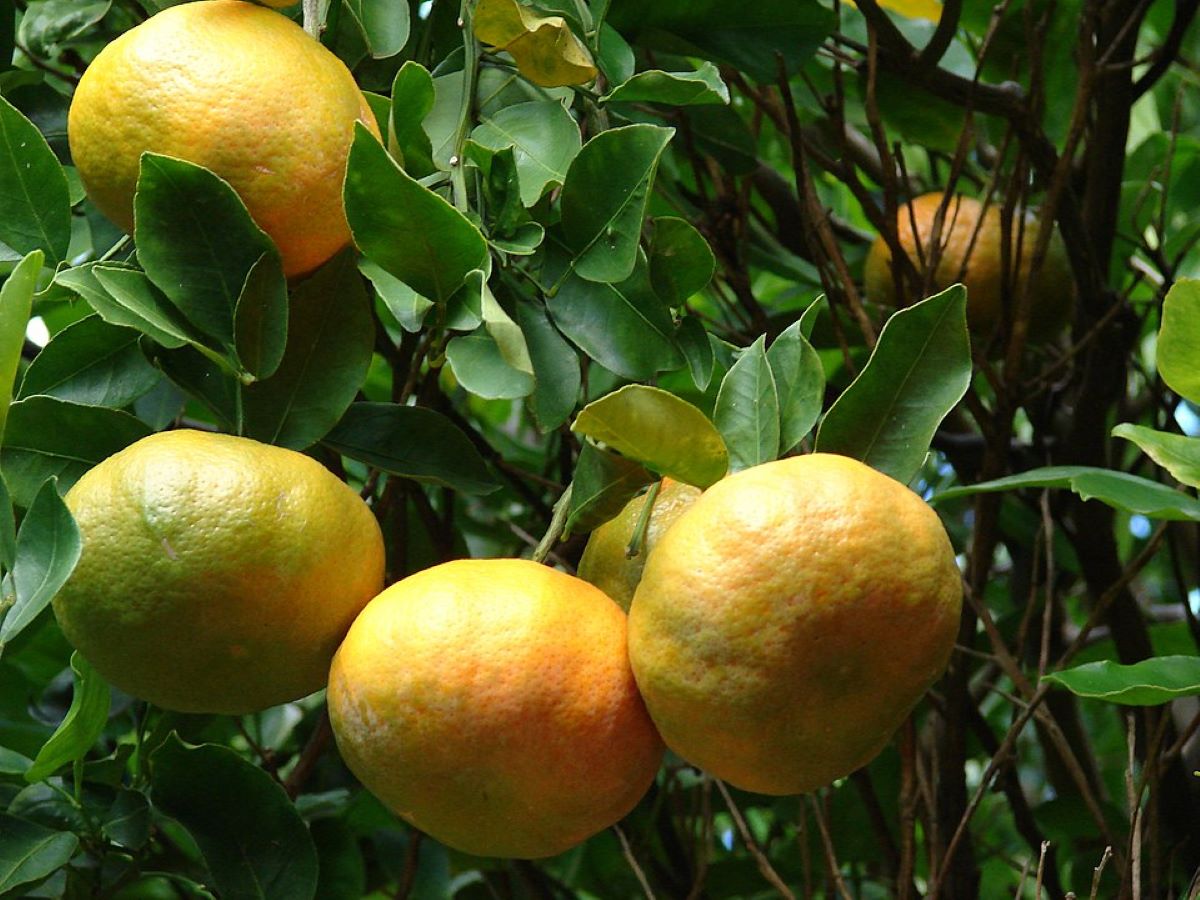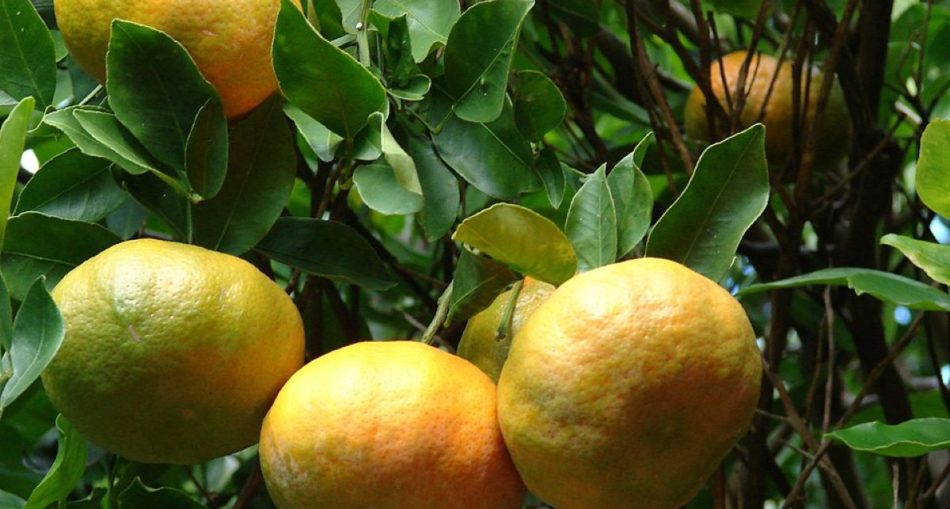Apart from oranges, Tangerines are the highest produced citrus is Guyana. They are even exported to countries like Barbados and Canada but most of our Tangerine production are consumed locally, sold at markets all across Guyana. Some other names for the Tangerine are the Unshu Orange, Satsuma Orange, Temple Orange and mandarin. However the scientific name of the fruit is Citrus reticulata. In Guyana the most produced is cultivar Dancy.

Tangerines growing on a Tree – Photo By Forest & Kim Starr, CC BY 3.0, https://commons.wikimedia.org/w/index.php?curid=6183748
Origin of Tangerine
Tangerines, otherwise known as mandarins originated in Vietnam in Southeast Asian, and South China and Japan in East Asia. Different variations of tangerines are grown in tropical areas like India, China, Brazil, Guyana, parts of Central America, and the West Indies.
Description of Tangerine
Tangerine trees are evergreen and typically smaller than orange trees. grows up to fifteen (15) feet tall with thorns growing from the branches. Its branches are slender with lance-shaped leaves. The leaves of this citrus trees are long, narrow and dark green in colour. Tangerine flowers have a fragrant citrus smell and are white with five petals. The fruits of tangerines are reddish-orange when ripe and are small and flattened at the poles. They are said to be sweeter than oranges with a stronger taste. The skin is thin, slightly soft with a slightly pebble texture. The mesocarp is thin, white and bitter.
Scientific Classification Of Tangerines
- Domain: Eukaryota
- Kingdom: Plantae
- Phylum: Spermatophyta
- Subphylum: Angiospermae
- Class: Dicotyledonae
- Order: Rutales
- Family: Rutaceae
- Genus: Citrus
- Species: Citrus reticulata
Nutritional Value Of Tangerine
Each 100 grams of Tangerine contains:
- Folates: 16 µg
- Niacin: 0.376 mg
- Pantothenic acid: 0.216 mg
- Pyridoxine: 0.078 mg
- Riboflavin: 0.036 mg
- Thiamin: 0.058 mg
- Vitamin C: 26.7 mg
- Vitamin A: 681 IU
- Vitamin E: 0.20 mg
- Vitamin K: 0 µg
- Sodium: 2 mg
- Potassium: 166 mg
- Calcium: 37 mg
- Copper: 42 µg
- Iron: 0.15 mg 2
- Magnesium: 12 mg
- Manganese: 0.039 mg
- Zinc: 0.07 mg
Uses of Tangerine
- The Tangerine fruits are peeled and eaten when ripe.
- Tangerine peels are dried and used in many savory and sweet dishes, teas and herbal medicine.
- An essential oil made from Tangerines is used in foods, perfumes and medicines.
- The green exocarp of Tangerines is used to treat chest pain hypochondrium, gastro-intestinal distension, swelling of liver and spleen and liver cirrhosis.
- The Tangerine fruit is a source of anti-oxidants and chemical exfoliants that is used in specialized cosmetics.
- Tangerine peels are often used to make tea.
Health Benefits of Tangerine
- Rich in antioxidants – Antioxidants found in Tangerines help to prevent inflammation.
- Aids in Digestion – Tangerines contains fibre which improves digestion process and eases the movements of your bowels.
- Chronic Diseases – Citrus fruits including Tangerines help to lower the risks of chronic diseases, like cancer, diabetes and heart diseases in persons.
- Sepsis Cure – Sepsis is an infection that causes acute pain, pus formation, reddened wounds, and swelling. The essential oil of Tangerine is used to get rid of staphylococcus aureus bacterium which causes the Sepsis infection.
- Cell Growth and Repair – Tangerine essential oil can boost cell growth in your body as well as help in repairing.
- Skin Care – A homemade facial mask made of the Tangerine fruits is said to leave you with soft, fresh and blemish-free and bright skin.
- Hair Care – Tangerines helps to promote hair growth and slows the greying process of hair. Vitamin A in Tangerines helps to condition and moisturize the sebum in the scalp while Vitamin B12 reduces hair loss. and Vitamin C breaks down iron for absorption.
- Weight Loss – Tangerines have a high fibre content but are low in calories making them the perfect fruit in helping you to lose weight.
- Good for Pregnant women – Tangerines are rich in Vitamin B complex which also includes folate. Folate helps in neural tube formation and the formation of red blood cell in prenatal babies.
- Maintains Blood Pressure -Packed with potassium and sodium content Tangerines helps in the relaxation of blood vessels and to maintain a healthy blood pressure.
About Tangerines
Tangerines are a great source of Vitamin C and are a healthy option for a snack. This fruit is prized because of its strong, citrus taste. You can find Tangerines being sold at your local markets countrywide. They are a great alternative to oranges and are filled with as many nutrients!
Article References
- http://guyanachronicle.com/2020/04/05/tangerine
- https://en.wikipedia.org/wiki/Mandarin_orange#Genetics_and_origin
- https://pfaf.org/user/Plant.aspx?LatinName=Citrus+reticulata
- https://www.britannica.com/plant/tangerine-fruit
- https://homeguides.sfgate.com/grow-tangerine-tree-59430.html
- https://www.nutrition-and-you.com/tangerines.html
- https://www.cabi.org/isc/datasheet/13463
- https://www.delish.com/food-news/a26839032/benefits-of-tangerines/
- https://practicalplants.org/wiki/Citrus_reticulata
Discover more from Things Guyana
Subscribe to get the latest posts sent to your email.







